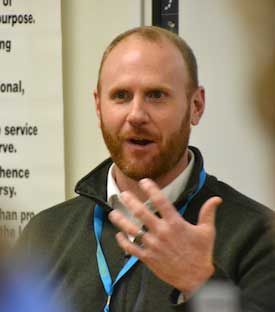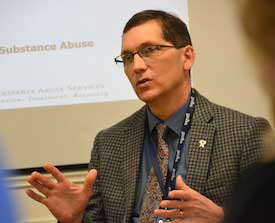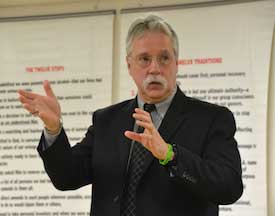Health officials praise collaboration in Orleans County
ALBION – Orleans County health care providers are working together to expand services to residents, the Leadership Orleans class was told on Thursday.

Paul Pettit, Public Health director in Genesee and Orleans counties, said Orleans continues to struggle with high rates of smoking and obesity.
The class of 26 members each month focuses on an aspect of the county. This month the group is taking a close look at healthcare in the county.
Paul Pettit, director of public health in Orleans and Genesee, went over the county’s latest standings in the annual County Health Rankings, which puts Orleans at 52nd out of 62 counties in the state for health outcomes. Orleans was 54th in health factors.
The county has a high rate of adult smoking (22 percent), adult obesity (36 percent) and a low access to clinical care for primary care physicians, dentists and mental health providers, according to the report. (Click here for more on the report)
Healthcare agencies have been working together to improve access to care. For example, the county’s Mental Health Department has gone from providing mental health services at its office behind the County Administration Building to 15 sites in the county, including at the local school districts and the county jail. Mental Health also has a new partnership with Oak Orchard Health, where mental health staff work out of the Oak Orchard site in Albion.
“There’s synergy,” O’Brien told Leadership Orleans. Human services “is 90 percent about relationships,” he said.
In rural counties, those relationships are even more critical, he said.

John Bennett, executive director of GCASA, speaks to Leadership Orleans. He said addiction is a very difficult illness to overcome.
O’Brien praised the County Legislature, county administrator and Community Services Board for embracing “very progressive” partnerships among the healthcare providers.
O’Brien is president of an eight-county consortium that received a $3.3 million grant to improve services.
O’Brien responded to questions from the Leadership Orleans class. He said there remains a stigma with mental health, where many people are reluctant to seek help. That remains a big barrier to care.
The county is fortunate to have an active Suicide Prevention Coalition, he said. Suicide hits white males, ages 45 and older, at the highest rate.
He also shared about the prevalence of sexual abuse, where 1 in 3 women have been sexually abused or exposed to it, while 1 in 7 men have been sexually abused. A mental health therapist can help people work through the trauma.
“Healing doesn’t mean the damage never existed,” O’Brien said, citing a famous quote. “It means it no longer controls my life.
John Bennett of GCASA leads an agency that has expanded in Orleans County, adding residential services.
Bennett, responding to a question, said addiction is a powerful disease that is difficult to overcome, even when a person has been clean for a year.

Mark O’Brien of Mental Health said the county agency now has Mental Health staff working out of 15 sites in the county.
Anxiety, fear and depression often kick in, leading to a relapse.
“The nature of the illness is when you relapse you are full blown into it,” Bennett said. “It is an illness unlike any other.”
Bennett said is concerned about the possibility of legalizing recreational marijuana in the state. He cited problems in Colorado, where dispensaries are making marijuana products that look like candy.
There are reports of increased motor vehicles accidents and emergency room trips since recreational marijuana was legalized, he said.
Bennett understands the social justice push for legalizing recreational marijuana, where people don’t tend to fight, resist arrest or be abusive, especially compared to people who use alcohol.
Pettit, the public health director, said public health officials are concerned about misinformation, especially with an anti-vaccine movement that is allowing some illnesses and diseases to spread.
“People should go to agencies and organizations for information that is based in science,” he said.
The local Public Health Department attends many community events, and keeps an active Facebook and Twitter presence, trying to get accurate information out to the community, Pettit said.
More residents also are self-diagnosing on WebMD rather than going to the doctor, which is a concern, Pettit said.
The Leadership Orleans class also was trained on Narcan, which can help stop an overdose. The class also learned how to “Stop the Bleed” and apply a tourniquet if someone is bleeding.
The class heard from other healthcare leaders in Medina, with a focus on healthcare collaborations.
Those panelists included Dan Ireland, president of United Memorial Medical Center; Mark Cye, CEO of Orleans Community Health; and Mary Ann Pettibon, CEO of Oak Orchard Health.










































































